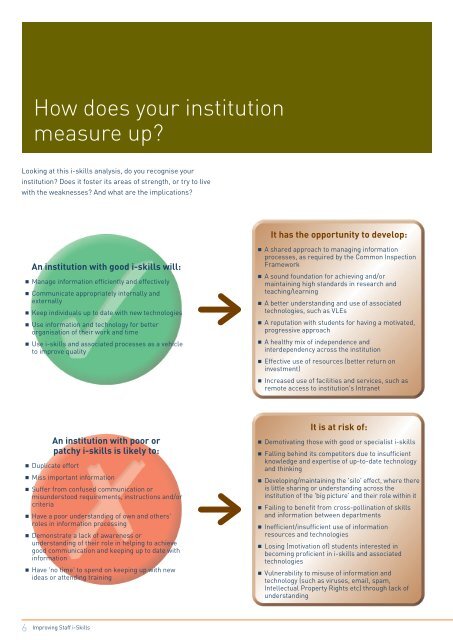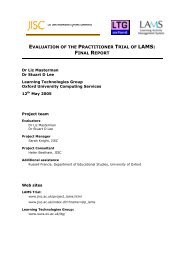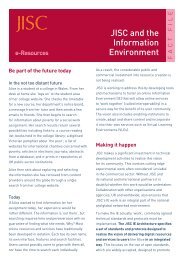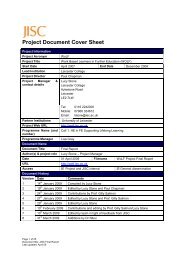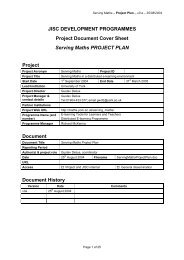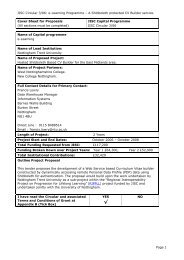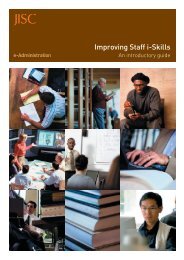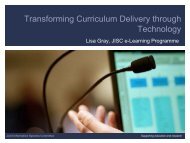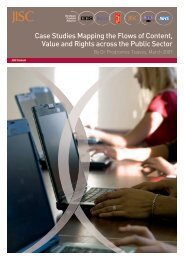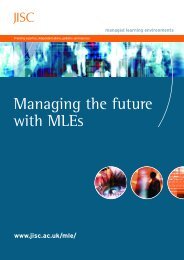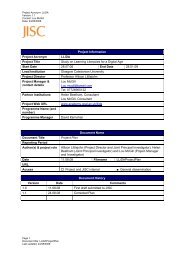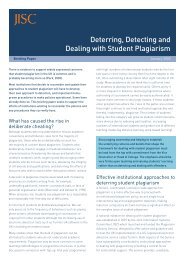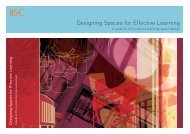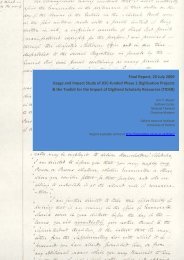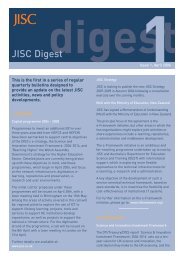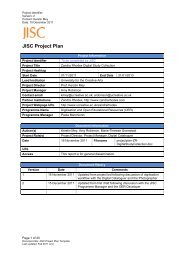Improving Staff i-Skills - Jisc
Improving Staff i-Skills - Jisc
Improving Staff i-Skills - Jisc
You also want an ePaper? Increase the reach of your titles
YUMPU automatically turns print PDFs into web optimized ePapers that Google loves.
How does your institution<br />
measure up?<br />
Looking at this i-skills analysis, do you recognise your<br />
institution? Does it foster its areas of strength, or try to live<br />
with the weaknesses? And what are the implications?<br />
It has the opportunity to develop:<br />
An institution with good i-skills will:<br />
■ Manage information efficiently and effectively<br />
■ Communicate appropriately internally and<br />
externally<br />
■ Keep individuals up to date with new technologies<br />
■ Use information and technology for better<br />
organisation of their work and time<br />
■ Use i-skills and associated processes as a vehicle<br />
to improve quality<br />
■ A shared approach to managing information<br />
processes, as required by the Common Inspection<br />
Framework<br />
■ A sound foundation for achieving and/or<br />
maintaining high standards in research and<br />
teaching/learning<br />
■ A better understanding and use of associated<br />
technologies, such as VLEs<br />
■ A reputation with students for having a motivated,<br />
progressive approach<br />
■ A healthy mix of independence and<br />
interdependency across the institution<br />
■ Effective use of resources (better return on<br />
investment)<br />
■ Increased use of facilities and services, such as<br />
remote access to institution's Intranet<br />
An institution with poor or<br />
patchy i-skills is likely to:<br />
■ Duplicate effort<br />
■ Miss important information<br />
■ Suffer from confused communication or<br />
misunderstood requirements, instructions and/or<br />
criteria<br />
■ Have a poor understanding of own and others'<br />
roles in information processing<br />
■ Demonstrate a lack of awareness or<br />
understanding of their role in helping to achieve<br />
good communication and keeping up to date with<br />
information<br />
■ Have 'no time' to spend on keeping up with new<br />
ideas or attending training<br />
It is at risk of:<br />
■ Demotivating those with good or specialist i-skills<br />
■ Falling behind its competitors due to insufficient<br />
knowledge and expertise of up-to-date technology<br />
and thinking<br />
■ Developing/maintaining the 'silo' effect, where there<br />
is little sharing or understanding across the<br />
institution of the 'big picture' and their role within it<br />
■ Failing to benefit from cross-pollination of skills<br />
and information between departments<br />
■ Inefficient/insufficient use of information<br />
resources and technologies<br />
■ Losing (motivation of) students interested in<br />
becoming proficient in i-skills and associated<br />
technologies<br />
■ Vulnerability to misuse of information and<br />
technology (such as viruses, email, spam,<br />
Intellectual Property Rights etc) through lack of<br />
understanding<br />
6<br />
<strong>Improving</strong> <strong>Staff</strong> i-<strong>Skills</strong>


